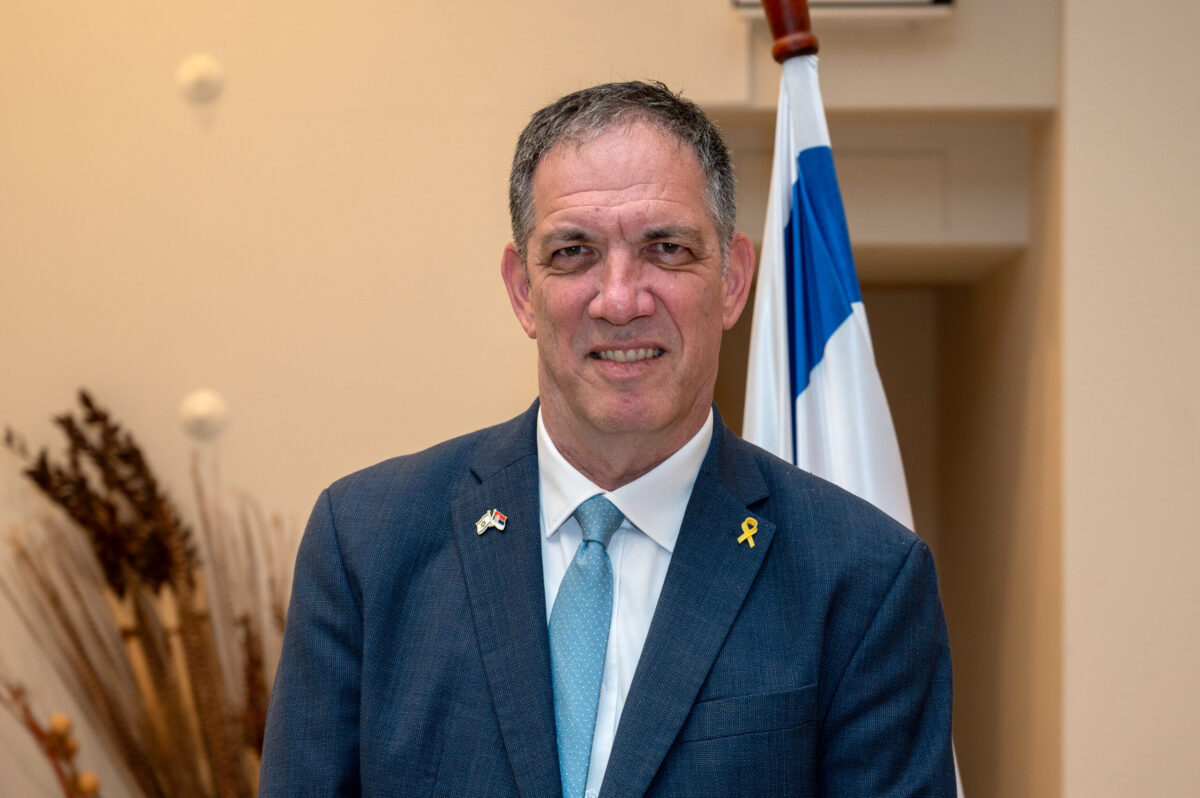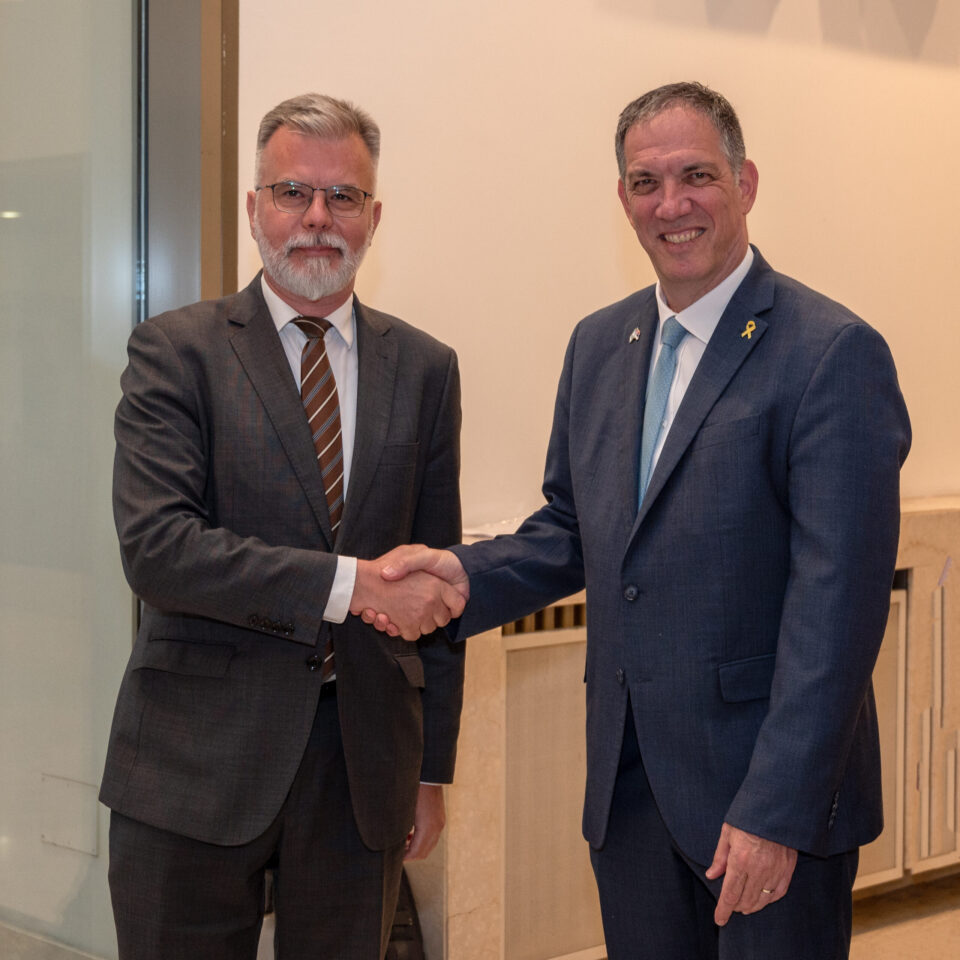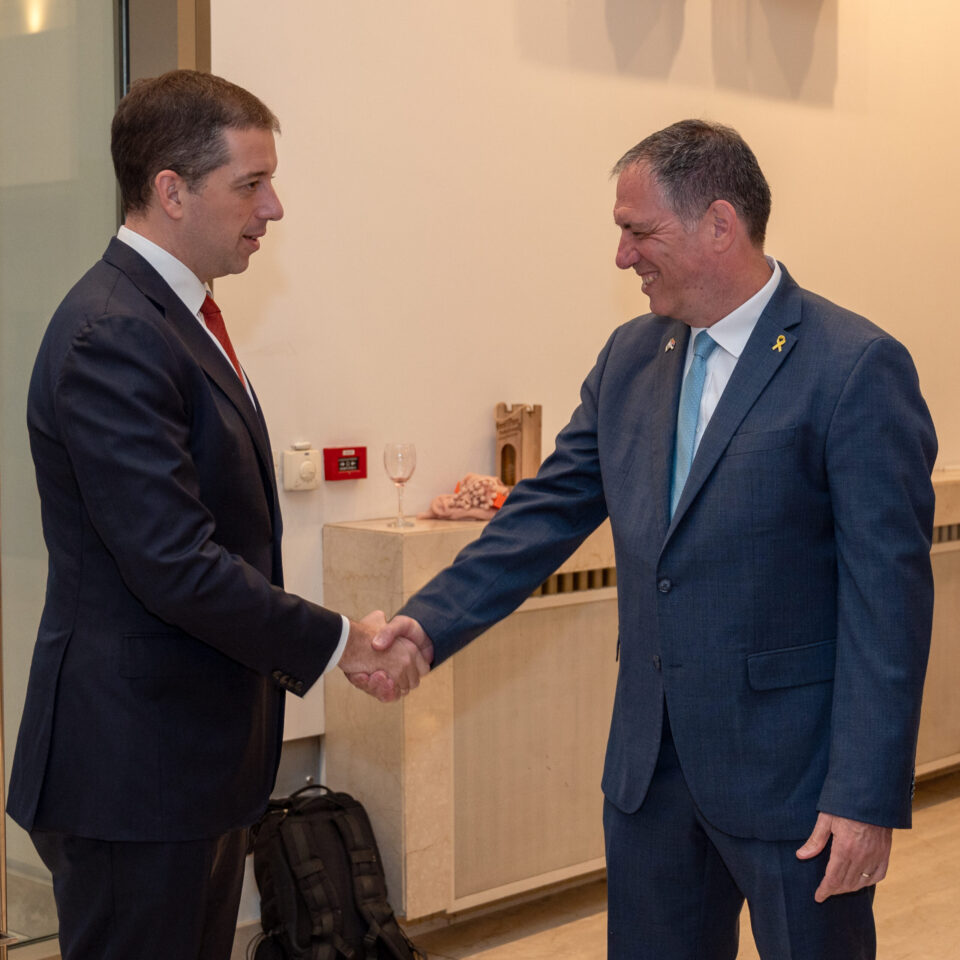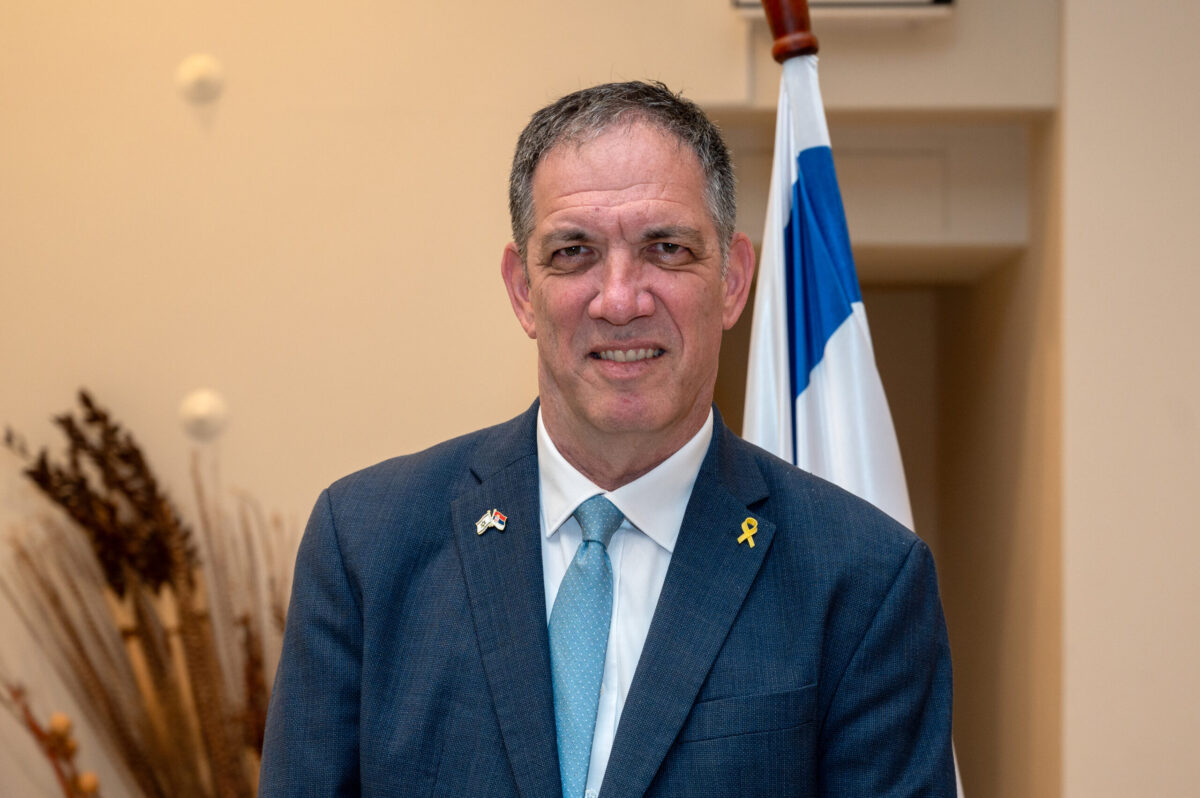We posses technology, know how, experience and all of that is on disposal to Serbian municipalities and the industry
 Israel is known for its advancements in renewable energy technologies. What opportunities do you see for collaboration between Israel and Serbia in this sector, and how can both countries benefit from such partnerships?
Israel is known for its advancements in renewable energy technologies. What opportunities do you see for collaboration between Israel and Serbia in this sector, and how can both countries benefit from such partnerships?
Israel and Serbia have signed an MOU on Cooperation in Green Energy in February 2022. The document foresees, beside promoting investments in green energy, also cooperation and exchange of scientific and technical experiences in the field of renewable energy, green hydrogen, geothermal energy etc. The legal framework for joint scientific projects in these areas exists. It’s up to academia, industry and startup community to use it.
We will elaborate more on Israeli investments in green energy in Serbia in continuation of this interview. For now, i would say that we are very pleased with the contribution of our companies to the green transition of Serbia.
Credible Israeli investors in wind energy such as Enlight and solar such as Nofar, L.O.I. 360 already positioned themselves on the green energy map of Serbia. We as en embassy, experience increased interest, so there are other companies still in search for projects which we expect to be in pipeline in the near future.
 Environmental sustainability is a global priority. Can you share any successful ecological initiatives from Israel that could be implemented in Serbia to address common environmental challenges?
Environmental sustainability is a global priority. Can you share any successful ecological initiatives from Israel that could be implemented in Serbia to address common environmental challenges?
Project and solution which can serve as an example of how the waste can be turned to energy and also in which way a landfill area can be rehabilitated and serve as a recreational and educational park, is Hyria Recycling Park and Ariel Sharon Park located on the outskirts of Tel Aviv. Dan Region Association of Towns for Sanitation and Waste Disposal, which operates Hyria Recycling Park, was funded at 1966 by six municipalities that became council members: Tel aviv Jaffa, Holon, Ramat Gan, Bat Yam, Bnei Brak and Givatayim.
We are very pleased with the contribution of our companies to the green transition of Serbia
The association receives every day 3,000 tons of municipal waste from the six municipalities that are members, and serves 20-25 more municipalities, as well as private contractors. Hiriya Recycling Park is leading the country’s waste management field. On a daily basis it produces 1000 CMH of biogas in its Refused Derived Fuel plant.
Ariel Sharon Park is an ambitious environmental rehabilitation project, one of the biggest in the world. The park is set on the Hiriya, formerly a 60 meter high mound of waste next to Ben Gurion Airport, now converted into the centerpiece of the new Ariel Sharon Park. The park contains cycling trails, a zoo, recreational pond, picnic areas etc.
At the visitor center, virtually everything (including the building itself – which was once a huge compost shed) is recycled: furniture and accessories are made out of tires, cans and bottles, as is a gigantic, colorful ceiling fixture.
Beside these two examples in cleantech and waste management, Israel is a world leader in waste water treatment with 90% of waste water treated to the level of use in agriculture.
We posses technology, know how, experience and all of that is on disposal to Serbian municipalities and the industry which will have to meet the EU standards but more than that to keep the environment clean and safe for the generations to come!
Our economic department is open to connect you to the relevant Israeli representatives in the water sector.
Israel has a robust biotech industry. What are some of the latest breakthroughs in Israeli biotechnology that you believe could have significant impacts on healthcare or agriculture in Serbia?
Israel is a leading center of research in the field of life sciences and exact sciences and is ranked fourth in a global index measuring the average number of quotations per articles published in multidisciplinary research. Israel is ranked in the top five countries for the number of patents per capita and the Weizmann Institute of Science was ranked second in the world in the prestigious ‘100 Nature Index’. Israel is also home to world-leading clinical research centers.
Israel is a world leader in waste water treatment with 90% of waste water treated to the level of use in agriculture
It has a strong medical device industry that includes more than 600 companies, exports of approximately 1.6 billion dollars, and R&D centers of the world’s leading medical devices companies (Medtronic, General Electric, Philips and others).
Some of the examples of Israeli bio-convergance breakthrougs are:
Nanorobotics for Drug Delivery
Nano-Ghost27 is a nanometric drug delivery system developed by Prof. Marcelle Machluf from the Technion. The system is capable of homing in on cancerous tumors and precisely delivering the treatment to the cancerous cells without harming the surrounding healthy cells.
 Regenerative Medicine
Regenerative Medicine
The Precise-Bio company29 has developed a revolutionary technology in the field of tissue printing and engineering that enables printing at the resolution of an individual cell. The company is regarded one of the leaders in this field and is the first in the world to implant a printed cornea in a para-clinical trial and to demonstrate complete functionality of the engineered organ.
Israel has an opportunity to become a leading player in the bio-convergence industry thanks to its strong technological base and other vital fundamentals including strengths in physics, engineering, data science, leading research in life sciences and the ability to integrate all these fields.
Serbia also keeps biotech sector high on its economic development agenda.
There are already some connections established between the two biotech ecosystem. The embassy put it as priority and there will be more opportunities and platforms for joint cooperation in the upcoming period.
Innovation is a key driver of Israel’s economic growth. How can Serbia learn from Israel’s experience in fostering a culture of innovation and entrepreneurship to boost its own economy?
Israel, as for many historic decisions, had no choice but to turn to know how of its people. As a country scarce in natural resources, our government established the Office of the Chief Scientist early as in 1969 under the Ministry of Economy and Industry, tasked with implementing government policy regarding support and encouragement of industrial research and development projects.
In the early ‘90s, Israel invested in two programs that put wind in sails of the high tech industry. One of them was The Yozma program which led to establishment of 10 venture capital funds dedicated to attracting foreign investments. The rest is history…
The embassy actively works with and supports all the stakeholders of the Serbian startup ecosystem from the very beginning.
It is evident that the ecosystem is growing. Based on conducted international survey of Startup Genome, the value of Belgrade and Novi Sad ecosystem reached 1.11 billion USD in 2023 with 66% of annual growth.
Israel is also home to world-leading clinical research centers
Serbia is Chairing the Global Partnership of AI, it has an Institute for AI and a Strategy for development of this sector. The country is investing in establishment of a BIO4 campus as a unique hub for biotech industry, research and academia. It also established a Center for 4th industrial revolution we have cooperation with.
Taking into consideration all of the mentioned, Serbia is on a very good path and in certain areas such as gaming, blockchain and big data, a leading hub in this part of Europe.
Education and research play crucial roles in advancing technology and innovation. Are there any existing or upcoming educational exchange programs between Israel and Serbia aimed at promoting knowledge transfer in fields like renewable energy and biotechnology?
Investments in education, research and development are crucial in building, scaling and maintaining the knowledge/technology driven economy where most of the developed countries are headed to.
Israel as such, invests the highest percentage of its GDP in R&D among all OECD members. In 2022 it was 6%!
As for the education exchange cooperation we used to have running the Program of educational, scientific, cultural, youth and sports cooperation since 2009. It is in pipeline of Agreements to be renewed.
However, Israel with its Agency for International Cooperation and Development MASHAV offers a numerous number of training courses in various fields from postharvest technologies to startup accelerators, water treatments, rural development, trauma and disaster preparedness. The embassy distributes courses to the target audience and before Covid we used to have round 50 professionals from Serbia attending courses in Israel.
MASHAV switched courses to online during Covid and these days the activity has been back on track after temporary suspension since October the 7th.
Currently, we have two courses with open calls to apply!
Investing in green technology is essential for a sustainable future. How can Israeli investors and companies contribute to the development of green technology in Serbia, and what incentives might encourage such investments?
Transition to green sources of energy is inevitable for various reasons: sustainability, healthier enviornment, raising energy efficiency and independence which is crucial for any country. In this regards, we are very proud of achievements of the Israeli investors in green transition of Serbia which has even higher targets than Israel!
Our companies like Enlight which togehter with their Serbian partner New Energy Solutions developed two windfarms: Kovačica of 104MW installed capacity – operating and Pupin of 95MW which will be operational by the end of the year.
Serbia is on a very good path and in certain areas such as gaming, blockchain and big data, a leading hub in this part of Europe
Another Israeli company, Nofar Energy, has just announced start of construction of Ada solar park of 26MW, the biggest solar park in Serbia at the moment which should be added to the grid by the end of the year which will bring energy stability to the country in the upcoming winter season!
We also have company LOI 360 developing an agri solar parks in Sremska Mitrovica of 75MW.
All of these investments signify that Serbia enjoys a positive outlook among Israeli renewable energy investors and definately is under loop which is also reflected in high number of inquiries the embassy receives.
Looking ahead, what are some potential areas for future economic partnerships between Israel and Serbia that could drive mutual growth and development, particularly in high-tech industries?
Priority sectors that we as an embassy promote are: clean tech which includes renewable energy and waste water treatments, hi tech and startup ecosystem, cyber and biotech. In line with Serbia’s economic agenda we would put priority on renewable energy, cyber and biotech as sectors to be exploited much more. Israel has a cutting edge, efficient technology in regards to waste water treatment and is the country that treats 80% of waste water to the level of agriculture use. In line with its specific geopolitical position, Israel had to face cyber threats much earlier than other Western countries, thus it has a wide portfolio of cyber security solutions for governments, companies and critical infrastructure. We invite and welcome Serbian authorities and private companies to engage with Israeli companies directly or with our support so as to bring benefits such as clean environment, safety, efficiency and higher standard of living for all.








